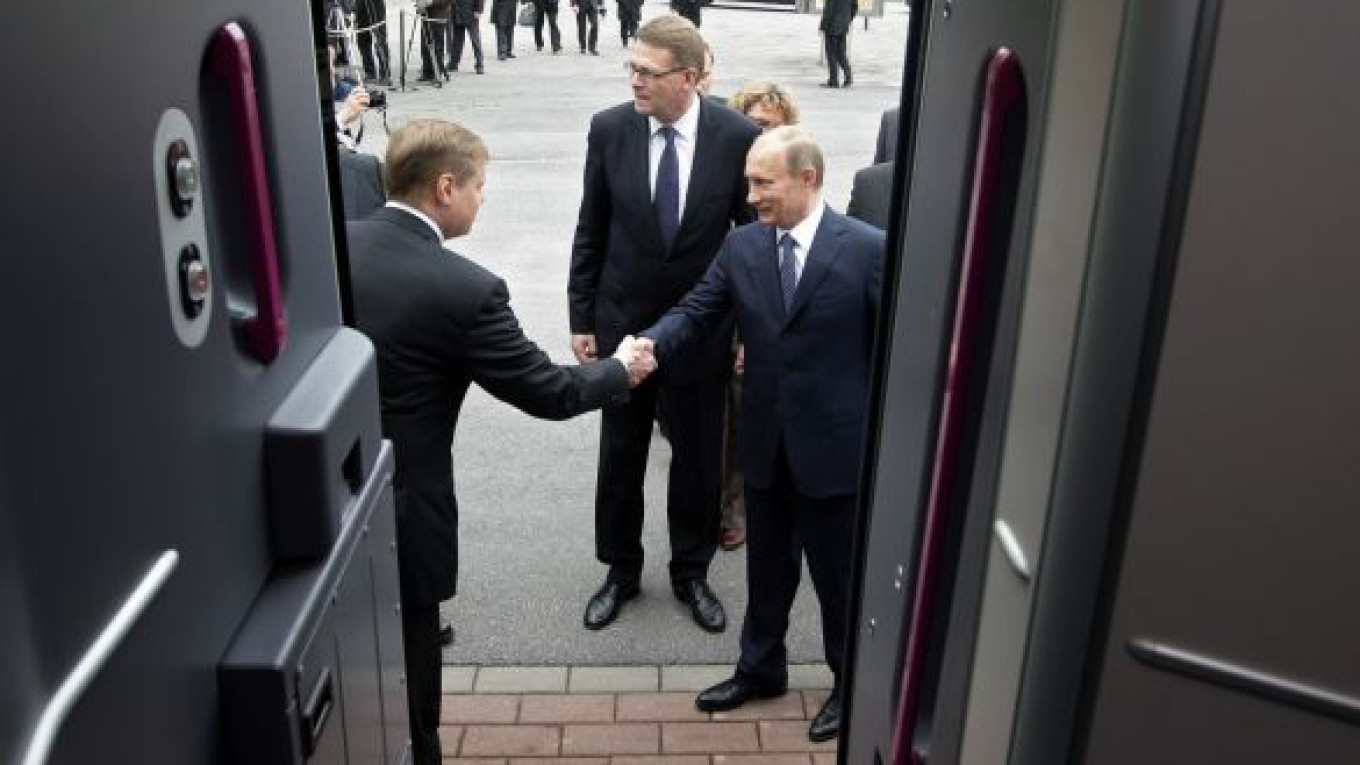Russia signed a deal Thursday extending a Finnish lease on a key waterway for another 50 years, allowing Helsinki to import timber and export paper and pulp.
Under the agreement, signed by Prime Minister Vladimir Putin in Finland, Russia will continue leasing its stretch of the 43-kilometer Saimaa Canal that connects Finnish lakes to the Gulf of Finland after the current 50-year contract expires in 2013.
The canal runs from the city of Lappeenranta, in the southwestern Finland, to the Leningrad region city of Vyborg. Finland agreed to pay a rent of at least 1.2 million euros ($1.5 million) per year, up fourfold from 300,000 euros. The pay may rise depending on the number of passing ships.
Putin, who spoke at a meeting of the EU-Russia Innovation Forum, described the deal as a show of the “special nature of our relations” and “trust” in talks with his Finnish counterpart, Matti Vanhanen, before they signed the accord in Lappeenranta.
The new agreement expands the usage of the canal by allowing passenger vessels from third countries to navigate it as well, the Finnish government said on its web site in March. It also seeks to exploit the scenic waterway's opportunities for the tourist industry and pleasure boating.
Finland will no longer lease Maly Vysotsky Island, or Ravansaari as it is known in Finland, during the next 50 years, the Finnish government said in a memo Thursday. Instead, the lease will include a new road between the border checkpoints of Nuimaa and Brusnichnaya.
Ships carry about 2 million metric tons of cargo across the canal every year, meeting the needs of some 20 Finnish companies that employ 7,000 people.
Russia gained the 20-kilometer portion of the canal following a brief war with Finland in 1940.
In other deals, state-owned shipping company Sovcomflot and three Finnish companies, including STX Finland, signed a memorandum of understanding on development and construction of an icebreaker for Sovkomflot to clean up oil spills in the Baltic Sea. The other Finnish companies were Aker Arctic Technology and Southeast Trading. Rosmorport, a Russian state enterprise that manages port infrastructure, also signed the memorandum.
State-owned railway-equipment maker Transmashholding agreed to set up a 50-50 joint venture with Finland’s Waertsilae to develop and produce diesel engines for trains, ships and power plants. The agreement calls for 1.8 billion rubles ($58 million) of investment, Transmashholding spokesman Artyom Ledenev said, Bloomberg reported.
The two companies will upgrade an existing plant in the Russian city of Penza, which will begin operation in 2012, Ledenev said. Waertsilae makes ship engines and power plants.
Putin and Vanhanen kicked off their meeting Thursday by taking a tour of a high-speed train that is scheduled to begin shuttling between St. Petersburg and Helsinki in December, reducing the travel time to three hours from the current 5 1/2 hours.
Atomstroiexport may invite Fortum to work on a $20 billion project to construct Turkey’s first nuclear power plant after a bid for a Finnish project was rejected, the Russian reactor builder’s first deputy president Timur Ivanov said.
Atomstroiexport may also invite Fortum to help build the Baltic nuclear plant in Kaliningrad and to seek projects in third countries, he told reporters in Lappeenranta.
A Message from The Moscow Times:
Dear readers,
We are facing unprecedented challenges. Russia's Prosecutor General's Office has designated The Moscow Times as an "undesirable" organization, criminalizing our work and putting our staff at risk of prosecution. This follows our earlier unjust labeling as a "foreign agent."
These actions are direct attempts to silence independent journalism in Russia. The authorities claim our work "discredits the decisions of the Russian leadership." We see things differently: we strive to provide accurate, unbiased reporting on Russia.
We, the journalists of The Moscow Times, refuse to be silenced. But to continue our work, we need your help.
Your support, no matter how small, makes a world of difference. If you can, please support us monthly starting from just $2. It's quick to set up, and every contribution makes a significant impact.
By supporting The Moscow Times, you're defending open, independent journalism in the face of repression. Thank you for standing with us.
Remind me later.


